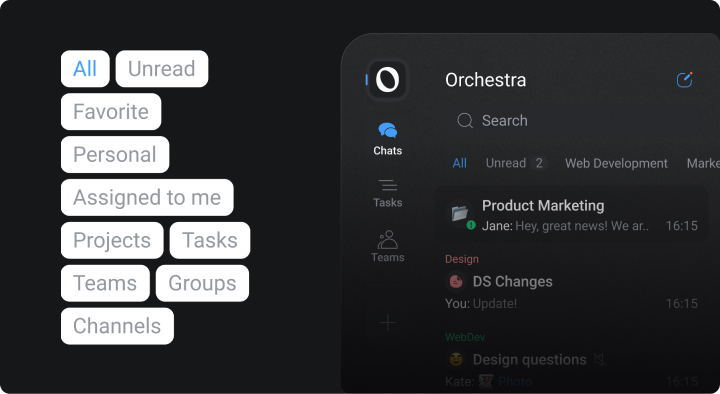Challenges in Distributed Teams and How to Overcome Them
Explore the challenges of managing distributed teams and discover actionable solutions, like strategies and Orchestra itself, to boost productivity and collaboration.
As distributed teams become more common in today's global workforce, the challenges of managing them are increasing too. Whether you're working with remote developers across time zones or coordinating efforts between creative teams in different countries, managing a distributed workforce is no small feat. Luckily, with the right strategies and tools, such as Orchestra, you can overcome these hurdles and build highly productive and collaborative teams.
In this article, we'll dive deep into the most common challenges faced by distributed teams and provide actionable solutions to overcome them using both general management strategies and specific features offered by Orchestra. Let's explore how you can make your distributed team work efficiently and seamlessly.
Communication barriers
One of the most significant hurdles in managing distributed teams is communication. When employees are in different locations or time zones, quick conversations that would typically take place in person are delayed or missed altogether. These communication gaps often lead to misunderstandings, missed deadlines, and a lack of team cohesion.
Issues
- Information silos. Distributed teams often rely heavily on email or fragmented messaging platforms, making it hard for all members to stay updated.
- Delayed feedback. With time zone differences, feedback can be delayed, slowing down workflows.
- Miscommunication. Without visual cues or real-time conversations, messages can be misinterpreted.
Building trust and team spirit
In a distributed team, it's easy for individuals to feel isolated or disconnected from their colleagues. This lack of personal interaction can lead to decreased motivation, poor team spirit, and even a sense of distrust among team members.
Issues
- Isolation. Team members may feel disconnected from the company culture or miss the camaraderie that comes with working in a physical office.
- Lack of trust. Without personal interactions, trust may diminish, which can affect collaboration and productivity.
- Team cohesion. It's harder to build strong relationships without face-to-face meetings and shared experiences.
Time zone differences
Managing time zones is one of the biggest operational hurdles in distributed teams. When employees work across multiple regions, it becomes difficult to find overlapping work hours for real-time collaboration. This can result in delays, fragmented communication, and difficulties in project synchronization.
Issues
- Scheduling conflicts. Finding suitable times for meetings becomes more challenging as teams spread across different time zones.
- Delayed responses. Responses may be delayed as team members work in shifts or at varying hours.
- Loss of productivity. Teams working asynchronously may experience a lack of momentum or frequent interruptions.
Maintaining transparency and progress control
When teams are working remotely, one of the key challenges is ensuring that everyone has visibility into the status of projects and individual tasks. Without face-to-face interaction, managers may struggle to monitor progress, and team members can feel disconnected from the larger project goals.
Issues
- Lack of visibility. It can be difficult to see what team members are working on or how far along a project is.
- Tracking progress. Ensuring tasks are completed on time is challenging without a centralized system.
- Disconnection from goals. Without clear progress tracking, employees may lose sight of how their work contributes to the bigger picture.

Overcoming challenges with Orchestra
By now, it's clear that managing distributed teams is no small task. From communication barriers to time zone differences and tracking progress, distributed teams face unique challenges. However, with the right tools, many of these obstacles can be turned into opportunities for growth and increased efficiency. Orchestra provides a suite of tools designed specifically to address the key challenges of distributed work.
Here's how Orchestra can help
- Messaging-first workspace. Keep all team members connected through integrated messaging, video calls, and task-based discussions.
- Elegant task management. Ensure transparency with real-time task tracking, progress monitoring, and workload distribution. And create ties between chats and projects in one click.
- Time zone coordination. Use built-in calendar features and flexible task management to allow asynchronous work while maintaining project momentum.
- Social and professional interaction. Promote team bonding through both work-related and informal communication channels.
- Instant collaboration. Share documents, brainstorm ideas, and co-create solutions with Orchestra's collaborative tools, ensuring everyone stays aligned and focused.
Managing a distributed team successfully requires more than just great leadership— it requires the right tools to foster communication, collaboration, and transparency across time zones and locations. Orchestra's all-in-one workspace provides everything you need to overcome the common challenges faced by distributed teams.
FAQ
How can I ensure effective communication in distributed teams?
Use centralized communication tools like Orchestra, which integrates messaging, video calls, and task-based discussions to keep everyone on the same page.
How do I manage time zone differences in distributed teams?
With Orchestra's flexible task management and calendar features, you can coordinate work asynchronously, ensuring tasks are completed without delays.
What are some common challenges in managing distributed teams?
Common challenges include communication barriers, time zone differences, lack of transparency, and difficulty in building team spirit. Orchestra provides tools to help overcome all these issues.

